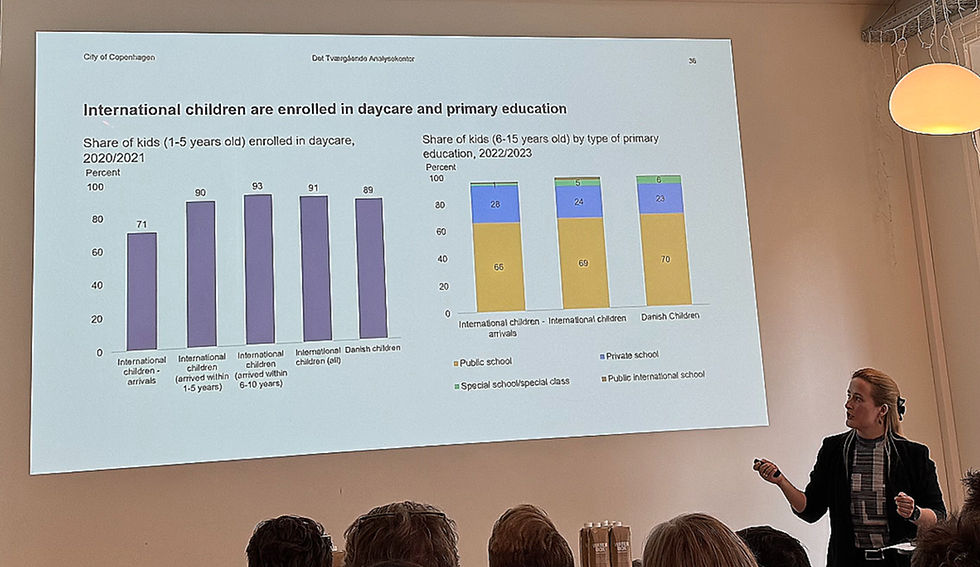Actionable Brand Strategies for Danish Startups
- Gizem Tore

- Oct 9, 2025
- 4 min read
“This post was created by AI and edited by me, for SEO purposes. It contains generic information, while lacking depth and authenticity. If you want to dive deeper and geek out on customised marketing and brand strategy, book a free 30-minute chat, with no strings attached."
Building a strong brand is essential for startups aiming to make a mark in the competitive Danish market. A well-crafted brand strategy can help startups differentiate themselves, build trust, and attract loyal customers. This blog post explores actionable brand strategies tailored for Danish startups, focusing on practical steps and insights to help new businesses thrive.
Understanding Startup Marketing Strategies in Denmark
Startup marketing strategies in Denmark require a clear understanding of the local market dynamics and consumer behaviour. Danish consumers value authenticity, sustainability, and quality, which should be reflected in your brand messaging.
To start, focus on defining your unique selling point (USP). What makes your startup different? How does it solve a problem better than others? Your USP should be clear and communicated consistently across all channels.
Next, leverage digital marketing channels effectively. Social media platforms like LinkedIn, Instagram, and Facebook are popular in Denmark and offer cost-effective ways to reach your target audience. Use content marketing to share stories about your brand’s mission, values, and products.
Networking and partnerships are also crucial. Denmark has a vibrant startup ecosystem with many incubators, accelerators, and co-working spaces. Collaborate with other startups and industry players to increase your brand visibility.
Use local language and cultural references in your campaigns.
Highlight sustainability efforts if applicable.
Engage with your audience through interactive content like polls and Q&A sessions.

Key Elements of Effective Startup Marketing Strategies
To build a successful brand, startups must focus on several key elements:
1. Brand Identity
Create a strong brand identity that includes a memorable logo, consistent color palette, and a tone of voice that resonates with your audience. Your brand identity should reflect your startup’s personality and values.
2. Customer-Centric Approach
Understand your customers’ needs and preferences. Use surveys, interviews, and analytics to gather insights. Tailor your messaging and product offerings accordingly.
3. Content Marketing
Develop valuable content that educates and engages your audience. Blog posts, videos, and infographics can help establish your startup as an authority in your niche.
4. Social Proof
Collect and showcase testimonials, reviews, and case studies. Social proof builds trust and credibility, especially for new brands.
5. Consistency
Maintain consistency across all touchpoints, from your website to social media and customer service. Consistency reinforces brand recognition and reliability.
6. Adaptability
Be ready to adapt your strategies based on market feedback and changing trends. Flexibility is key for startups navigating uncertain environments.
By focusing on these elements, startups can create a solid foundation for growth and customer loyalty.

What are the 5 pillars of brand strategy?
Understanding the core pillars of brand strategy helps startups build a cohesive and effective brand. These five pillars are:
1. Brand Purpose
This is the reason your brand exists beyond making money. It should inspire and guide your business decisions. For example, a Danish startup focused on eco-friendly products might have a brand purpose centered on sustainability.
2. Brand Positioning
Position your brand clearly in the market. Identify your target audience and how you want to be perceived compared to competitors. Positioning helps customers understand why they should choose you.
3. Brand Messaging
Craft clear and compelling messages that communicate your brand’s value and personality. Messaging should be consistent across all platforms and tailored to different audience segments.
4. Brand Visuals
Visual elements like logos, typography, and colors create immediate recognition. Ensure your visuals align with your brand personality and appeal to your target market.
5. Brand Experience
Every interaction a customer has with your brand contributes to their overall perception. Focus on delivering excellent customer service, user-friendly websites, and engaging social media experiences.
By mastering these pillars, startups can create a strong, memorable brand that resonates with customers and stands out in the Danish market.

Practical Tips for Implementing Brand Strategy for Startups
Implementing a successful brand strategy requires careful planning and execution. Here are some practical tips:
Start with research: Understand your market, competitors, and customers deeply.
Position your brand: Define your value proposition, identify your ideal customer profile, segment your offerings, and determine the highest value your customers are willing to pay for.
Develop a brand guide: Document your positioning, brand’s visual and verbal identity.
Engage your team: Make sure everyone in your startup understands and embodies the brand values.
Use storytelling: Share your startup’s journey, challenges, and successes to connect emotionally with your audience.
Measure and adjust: Track key performance indicators (KPIs) like brand awareness, engagement, and customer loyalty. Use data to refine your strategy.
For startups looking to dive deeper into effective branding, exploring resources on brand strategy for startups can provide valuable insights and frameworks.
Building Long-Term Brand Loyalty in the Danish Market
Brand loyalty is crucial for sustainable growth. Danish consumers appreciate brands that are transparent, ethical, and customer-focused. To build loyalty:
Offer exceptional customer service with quick responses and personalized support.
Create loyalty programs or exclusive offers for repeat customers.
Maintain open communication through newsletters and social media.
Continuously innovate and improve your products based on customer feedback.
Support local causes or sustainability initiatives to strengthen community ties.
By nurturing relationships and delivering consistent value, startups can turn first-time buyers into lifelong advocates.
Developing and executing actionable brand strategies is a journey that requires dedication and adaptability. Danish startups that invest in clear branding, customer understanding, and consistent communication will be well-positioned to succeed in a competitive landscape.


